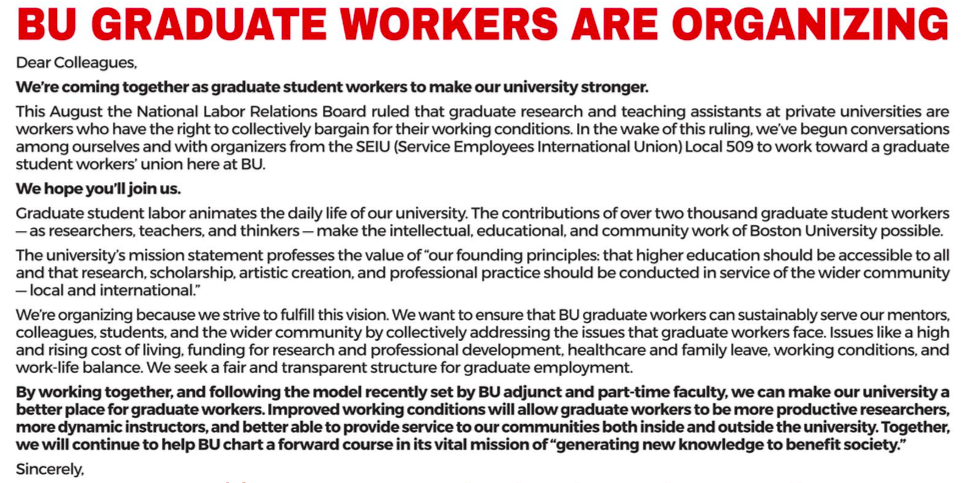 Here’s some exciting, positive news: colleagues at BU and I are launching a campaign to unionize graduate student workers at Boston University with the Service Employees International Union (SEIU)!
Here’s some exciting, positive news: colleagues at BU and I are launching a campaign to unionize graduate student workers at Boston University with the Service Employees International Union (SEIU)!
This August, the National Labor Relations Board authorized “student workers” (basically everyone from graduate students to teaching and research assistants) the right to collective bargaining and unionization. Although the implications of unionization efforts by graduate students is yet unknown, many graduate students are taking up the cause at universities across the country. So far, I believe, only NYU has actually “won” their union and have negotiated a contract with their university administration. But, there are at least 23 other universities that are also launching campaigns to unionize their graduate student workers as well including Brandeis University, Brown University, Columbia University, Pennsylvania State University, Tufts University, University of Chicago, University of Virginia, and Yale University.
Here is our open letter about forming the union at BU:

I see this as an incredibly important opportunity for a few reasons. First, as I’m beginning to learn firsthand, academic labor is precarious. There is next to zero job security (unless you are able to land a coveted tenure-track job) and the compensation for graduate student employees (who provide the vast majority of teaching labor at a university like BU where tuition can top $50,000 per year) comes to be less than minimum wage (about $22,000 per year). Because we as graduate student teachers and research assistants do provide the academic labor backbone for most universities, we should be able to engage in collective negotiations with our administration. We must be able to work together to demand fairer compensation, health insurance, and other forms of support to make this vocation and commitment to academic life more manageable, especially for those who do not have pre-existing financial means. Collective action is necessary to advance fairness and justice for academic laborers across the U.S.
Second, collective action and unions will be desperately needed to combat the oncoming tidal wave of Trumpism. Action such as the fight for $15 amongst fast food workers and other efforts to advance worker rights are going to be under attack from what is certain to be a kleptocratic regime that will attempt to crush workers rights. Graduate student unions have the potential to be a useful source of ally power. We will have unique sets of resources, relationships, access, etc to bring to bear in working with people struggling for basic social and economic rights.
Finally, as academics, many of us will work in public policy, government, think tanks, non profits, etc. Having a generation of academics, thinkers, policy makers, and NGO leaders with deep experience in collective action, organizing, and unions potentially could bode well for the labor movement in the future. If more people have a personal experience with unions, see the value of this type of collective action, we could imagine a comeback for unions. But, this is also the big danger: it’s reasonable to think that Trump will be hell bent to crushing collective labor. He’s had a long history of harming his own employees workers’ rights. In fact, unions are already bracing for policy shifts.
So, now is the time to act. We’ve got to move quickly at BU and I hope that other schools can make big gains in organizing and unionizing in the coming months. The future of collective bargaining, and social justice for workers across industries and fields, may be at stake.
Source link
